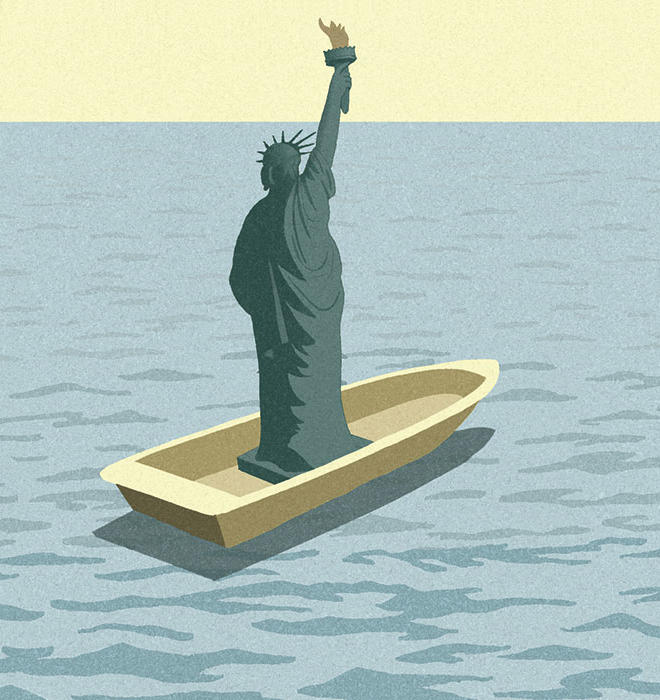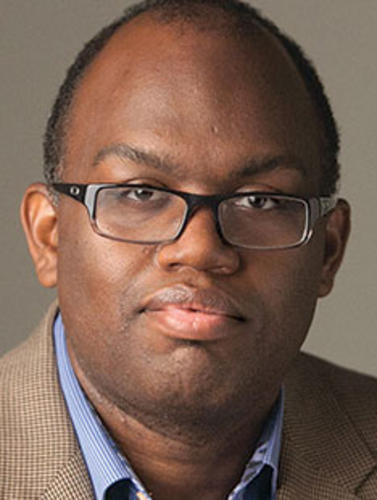
Dan-el Padilla Peralta ’06 is an assistant professor of classics at Princeton.
In the aftermath of Donald Trump’s election to the U.S. presidency, I spent several weeks attempting to sort out which obligations and responsibilities would need to take precedence in my personal and professional lives moving forward. I had come of age in a community that had been singled out for particular opprobrium and vilification by the Trump campaign: the 11 million undocumented. It was in the pages of PAW 11 years ago that I presented, for the first time in my own voice, my journey to Princeton as a Dominican-American without papers. I now return to these pages even more determined in light of recent events to affirm that these 11 million belong in the United States.
My initial venture into the autobiographical arts emboldened me to entertain the possibility that a fuller exposition of this journey might offer encouragement — and admonition — to a readership beyond Princeton. Not long after the PAW article came out, I decided to write a memoir. Undocumented: A Dominican Boy’s Odyssey from a Homeless Shelter to the Ivy League was published by Penguin Press in 2015. You may be wondering why my memoir had a nine-year gestation; surely a 20-something-year-old couldn’t have that much to say? The short answer: life! The long answer: graduate school, first in the United Kingdom (courtesy of the Daniel M. Sachs Class of 1960 Scholarship) and then at Stanford (where I received my Ph.D. in classics in 2014); and family happiness (in 2009 I began dating a fervent Yankees fan from Sparta, N.J.; six years later we got married).
Always humming in the background, impervious to all attempts at resolution, was anxiety about my immigration status. Having departed the United States in the fall of 2006 while still undocumented, I was granted a waiver of inadmissibility and a work visa to re-enter the country in 2007 for a part-time research-assistant position at Princeton. After completing my studies at Oxford in 2008, I applied for a change of status to a student visa to accept an offer of admission to Stanford’s doctoral program. In my fifth year at Stanford — and about two months after I submitted the final draft of the memoir manuscript to Penguin — I received a postdoctoral job offer from Columbia’s Society of Fellows. Off I raced to complete my dissertation and to apply for the work authorization that would enable me to begin my postdoctoral employment.
This work authorization, linked as it was to my student-visa status, was good for only one year, but my partner-in-the-struggle and I figured that after we pronounced vows to each other in March 2015 we would submit a “concurrent filing” to the immigration service to get the ball rolling on my permanent residency. The application was received by the U.S. Citizenship and Immigration Services (USCIS) in May 2015. After an 11-month wait, we were summoned to an interview at the Newark regional immigration office, to which we came prepared with heaps of documentation attesting to our lives together. The interview was a success, we were told; but in the summer of 2016 we learned that I would have to apply for a special waiver because I had previously lived in the United States as an undocumented immigrant — a waiver that would be granted only if I could prove to the examining officer’s satisfaction that the denial of my green-card application would cause “extreme hardship” to my spouse. The waiver request — a seven-page single-spaced cover letter, two three-page affidavits, and 89 pages of supporting materials — was finally approved the last week of January.
As long as I had a change-of-status application in the pipeline, I remained legally authorized to work, provided I filed the appropriate annual paperwork with USCIS. It was with this work authorization in hand that I was able to accept Old Nassau’s invitation to return as an assistant professor of classics. In the fall, my first term back, I taught the introductory Roman history course (CLA 218: “The Roman Republic”) and co-taught a graduate seminar on the Roman Middle Republic with my colleague Professor Denis Feeney. This spring, I am teaching a new course, “Citizenships, Ancient and Modern.” The premise of this new course is that our 21st-century contestations over access to citizenship have a long and fractious history; the goal of the course is to supply students with a variety of interpretive strategies for plotting such a history.
I would not say that my training as a Roman historian has uniquely positioned me to offer spanking-fresh insight into our contemporary situation, even if I can now pat myself on the back for designing the CLA 218 syllabus such that election week coincided with our coverage of the Gracchi. But likening Donald Trump to ancient Roman demagogues and oligarchs is almost irresistible, especially for those (like me) with a soft spot for historical comparison and analogy. Yielding twice to the temptation, in November 2015 I had written a two-part article for the online classics journal Eidolon (founded and edited by Donna Zuckerberg *14) in which I argued that Trump’s normalization of xenophobia, far from simply exhibiting some striking affinities with certain Roman precedents, also mimics the structural logic of these precedents: Woe-is-us economic populism, paired with imperial fantasies of grandeur, is sutured to a program of isolating and demonizing the most vulnerable segments of the polity.
I would not say that my training as a Roman historian has uniquely positioned me to offer spanking-fresh insight into our contemporary situation, even if I can now pat myself on the back for designing the CLA 218 syllabus such that election week coincided with our coverage of the Gracchi.
Dan-el Padilla Peralta ’06
At the time the article was published, it was still easy to regard Trump as a flash in the pan, one last invective-spewing eruption of white-supremacist revanchism. Not anymore: The country I have called my home for 25 of the past 27 years has elected a man who repeatedly and insistently menaces the communities that gave me life. That some percentage of the American electorate holds implacable feelings of hate toward me and other previously or currently undocumented folks, I find unsurprising. What has shaken me is that a significant percentage of the American electorate did not consider the broadcasting of xenophobia, racism, and anti-Semitism disqualifying — perhaps even found it alluring — when choosing a president.
One obvious takeaway is that white fragility is real. Of course, I would not be where I am today without having made the acquaintance many times over of the prickly white American id and its avatars. The cops who tore down the door to my Spanish Harlem apartment when I was a teenager; the high-school classmate who credited my admission to Princeton to affirmative action; the college classmate whose parents could not accept the implications of a post-Loving world; the Princeton alum and retired Marine Corps officer who wrote to correct me on my use of the term “inhumane” to characterize the treatment of the undocumented; the agent who asked, apropos of my memoir, “It’s not about race, is it?”; the well-intentioned cop from California’s San Joaquin Valley who could not be persuaded that the behavior of people protesting the national anthem at sports games was anything other than “unpatriotic”; the kind-seeming elderly woman who, after attending a reading of Undocumented at Labyrinth Books on Nassau Street, rang me at my East Pyne office to tell me that President Obama had made arrangements to ship in “illegal Haitians” to vote against Trump. White fragility wears many masks.
In some circles it is received wisdom that the failure of Hillary Clinton at the ballot box had to do with the Democratic Party’s failure to connect with an aggrieved white (male) middle class, for whom the economic havoc of globalization had been exacerbated by the added indignity of no longer feeling special — “identity politics” and “political correctness” being the primary culprits. According to proponents of this view, Democrats (among whom I count myself, not that I’m in a position yet to exercise that preference at the polls) should heed the feelings of the mostly white men and women who have been turned off by this minority-talk, this Black and Brown Lives Matter business. I have no patience with this “wisdom,” and not only because it both trivializes the suffering of the structurally oppressed and waves off the other factors responsible for November’s electoral outcome (racialized voter suppression, Russian meddling, rank misogyny). If anything, the identities and experiences of the outcast and exploited should move to the very center of our political discourse, rife as it now is with oversimplifications and misrepresentations.
In the case of the undocumented, the thundering about “the law,” the recriminations about their not having waited their turn “in line,” and their dehumanization as “illegals” all strike me as mere pretexts for removing and destroying brown bodies. The allegation that the undocumented are “taking away jobs” is based on an (at best) dubious interpretation of cloudy economic data, and the accusation that the undocumented siphon off public benefits is blithely ignorant of the amount that undocumented immigrants pay in taxes and into the social-safety net. But bullet points of fact, reasoned analysis, or explication of historical trends don’t seem to move the needle much for some people. The congressman who sat next to me on a Reunions panel last May and loudly proclaimed his indifference to ivory-tower academics whose attention to historical and demographic trends he saw as detached from “reality” was a harbinger of that post-fact world into which we have all been ushered, and for which we will need to harness a full arsenal of strategies for personal and civic empowerment.
READ MORE “My American Dream,” Dan-el Padilla Peralta ’06’s essay from the June 7, 2006, issue of PAW
In those weeks of reflection after the election, I reaffirmed my commitment to teaching and writing; I participated in conversations here at Princeton on how best to support those members of our community who may be subject to arbitrary removal — legal or extralegal in form — under the new president; and I tried to put on a face of indefatigable good cheer rebus in arduis before the high-school and college students for whom modeling and embodying the drive to social justice have taken on a new and vital significance.
However, with the signing of executive orders that authorized the construction of a border wall and imposed bans on immigrants from multiple countries, I have become convinced that each of us who benefits from the privilege of studying and working at Princeton will soon be called to make good on the University’s motto of service to the nation, to all nations, and to humanity. The siren call of shutting out the external world to focus doggedly on “knowledge for knowledge’s sake” will become almost irresistible. But the pursuit of knowledge, while never far removed from the political, can no longer be undertaken in isolation from the political: The new president and his collaborators have assaulted the very foundations of university life itself, both by threatening to deprive of funding any research seen as threatening or inimical to their interests and by targeting for detention, expulsion, and exclusion the many immigrant bodies who bring their knowledge and labor to our country and university.
We must resist any effort to bludgeon — or entice — Princeton into the complicity of silence.







1 Response
Norman Ravitch *62
8 Years AgoOur immigration problems are...
Our immigration problems are the result of an unacknowledged alliance of capitalism and populism. It is most unlikely that a populistic capitalist like Trump will solve the problems.